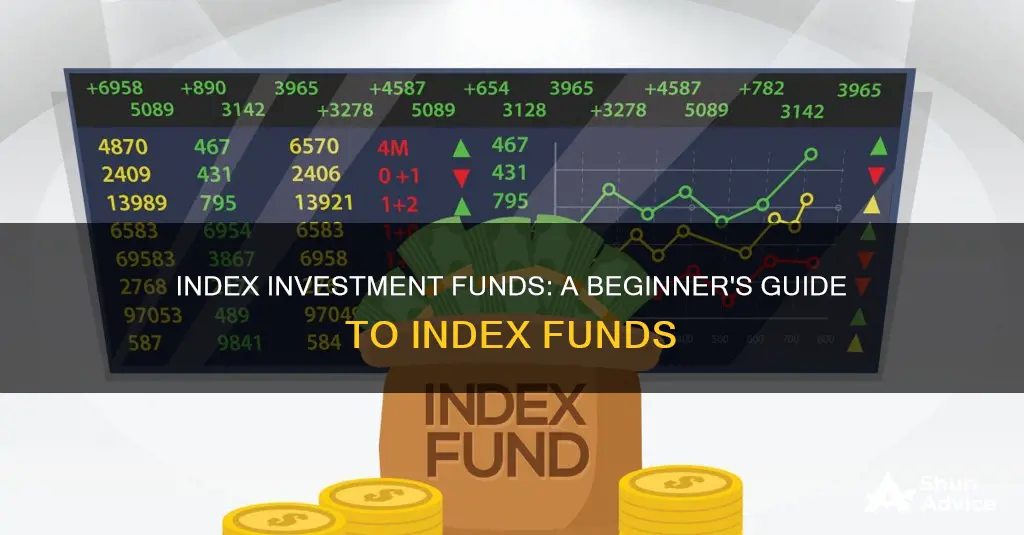
Index funds are a type of investment fund that tracks the performance of a market index, such as the S&P 500 or the Nasdaq Composite. They are designed to mirror the performance of financial market indexes and are ideal for long-term investing. Index funds are passively managed, meaning they aim to replicate the performance of an index without active management. This results in lower fees compared to actively managed funds. Index funds can be in the form of mutual funds or exchange-traded funds (ETFs) and offer investors broad market exposure and diversification across various sectors and asset classes. They are a popular investment choice due to their low costs, broad diversification, and consistent performance.
| Characteristics | Values |
|---|---|
| Type of fund | Mutual fund or exchange-traded fund (ETF) |
| Investment strategy | Passive |
| Investment portfolio | Aims to track a market index, e.g. S&P 500, Nasdaq Composite, ASX200 |
| Costs | Low expense ratios |
| Performance | Historically, long-term performance has exceeded that of actively managed funds |
| Risk | Lower risk due to diversification |
| Taxes | More tax-efficient than actively managed funds due to less trading |
| Investment minimums | Low minimum investment requirements |
| Liquidity | Excellent liquidity |
What You'll Learn

Index funds are a type of mutual or exchange-traded fund (ETF)
Index funds are considered passive investments, meaning they do not involve actively picking securities or timing the market. Instead, they aim to replicate the performance of a financial market index. This passive investing strategy allows index funds to trade as little as possible, keeping costs low for investors.
Index funds are available in both mutual fund and ETF forms. Mutual funds pool money from investors to buy a portfolio of stocks or bonds, and investors buy shares directly from the mutual fund company. ETFs, on the other hand, are traded on exchanges like individual stocks, allowing investors to employ more trading strategies such as timing ETF share trades and short selling.
Index funds are popular among investors due to their low costs, broad market exposure, and diversification benefits. They are also considered tax-efficient compared to actively managed funds since they generate fewer capital gains distributions.
When choosing an index fund, it is important to consider factors such as the fund's expenses, taxes, and investment minimums. Additionally, researching the fund's performance, comparing it to its benchmark index, and understanding its investment strategy are crucial steps in making an informed decision.
Mutual Funds: Lousy Long-Term Investments, Here's Why
You may want to see also

They track the performance of a market index, like the S&P 500
Index funds are a type of mutual or exchange-traded fund (ETF) that tracks the performance of a market index, such as the S&P 500. They are designed to replicate the performance of financial market indexes and are ideal for long-term investing.
Index funds are passive investments, meaning they employ a long-term strategy without actively picking securities or timing the market. They are a low-cost way to track a specific group of investments and are more broadly diversified than individual stocks. Index funds are also simpler to buy than each of the individual holdings within the index. For example, the Vanguard 500 Index Fund has tracked the S&P 500 faithfully in composition and performance, with a very small tracking error.
Index funds are defined as investments that mirror the performance of benchmarks like the S&P 500 by mimicking their makeup. They buy a basket of assets, such as stocks or bonds, to track the performance of these indices. Fund managers ensure that the index fund performs the same as its target index, known as its benchmark. This means that if the S&P 500 includes a particular stock, an index fund tracking the S&P 500 will also include that stock. The fund manager will also ensure that the weightings of the stocks in the index fund match those of the index.
The S&P 500 is the most widely followed market index and is considered a stand-in for the entire U.S. stock market. It tracks the stock prices of 500 of the largest U.S. public companies, representing about 80% of the market capitalization of all stocks traded in the U.S.
Index funds are a popular choice for investors as they offer low-cost, diversified, and passive investments that often outperform higher-fee, actively traded funds. They provide broad market exposure and diversification across various sectors and asset classes, depending on the underlying index. For example, the S&P 500 covers about 80% of all U.S. equities by market cap.
Overall, index funds offer a simple and cost-effective way to invest in a group of assets that mirror a market index like the S&P 500.
Index Funds: A UK Investor's Guide to Getting Started
You may want to see also

Index funds are a form of passive investment
Index funds pool money from multiple investors to purchase a diversified portfolio of stocks, bonds, or other assets. The fund managers maintain the asset allocation by tracking an index, and their primary goal is to replicate the performance of the chosen index without actively managing the fund. This passive strategy involves trading as little as possible to keep costs low. As a result, index funds have lower expenses and fees compared to actively managed funds.
The popularity of index funds has been growing, and they now account for a significant portion of the U.S. equity fund market. This shift towards passive investing is driven by the fact that index funds often outperform their actively managed peers. According to the S&P Indices Versus Active (SPIVA) scorecards, about 9 out of 10 actively managed funds failed to match the returns of the S&P 500 benchmark over a 15-year period.
Index funds offer several advantages to investors. Firstly, they provide broad market exposure and diversification across various sectors and asset classes. Secondly, they have lower fees and expenses, making them a cost-effective investment option. Thirdly, they are passively managed, which often results in lower expense ratios. Additionally, index funds are known for their tax efficiency, as the lower turnover rates typically result in fewer capital gains distributions.
Despite the benefits, index funds also have some drawbacks. One criticism is their lack of flexibility, as they are designed to mirror a specific market index. This means that when the market declines, the value of the index fund will also decrease, and they cannot pivot to alternative strategies. Additionally, index funds are automatically invested in all the securities within an index, which may include overvalued or weak companies.
Launching an Investment Fund: Legal Steps to Success
You may want to see also

They are renowned for being more tax-efficient
Index funds are renowned for being more tax-efficient than actively managed funds. This is because they are passively managed, meaning they are designed to replicate the performance of a financial market index, and therefore don't need to be actively traded. This passive management style results in lower turnover rates, which in turn leads to fewer capital gains distributions and a reduced tax burden for investors.
The passive nature of index funds means that fund managers do not need to buy and sell securities as often as they would with an actively managed fund. This reduces the number of taxable events, as buying and selling securities can trigger capital gains taxes. In many cases, the buying and selling of securities by active fund managers produce short-term gains, which are taxed at a higher rate.
Index funds also have the flexibility to choose which lots to sell when offloading a given security. This is because, over time, the fund accumulates hundreds or thousands of lots due to the constant inflow of investor money. The fund manager can then select the lots with the lowest tax implications to minimise the tax burden.
Additionally, index funds only sell their complete holdings of a specific security if the index itself removes the security. This is beneficial for investors, as such sales can result in large capital gains that they would ordinarily be taxed on.
The tax efficiency of index funds is further enhanced by their structure. Exchange-traded funds (ETFs), for example, are not involved in transactions when shares are sold to another buyer, which means they don't have to sell any securities and potentially trigger capital gains.
Overall, the passive management style, reduced trading activity, and structural benefits of index funds make them a more tax-efficient investment option.
Liquid Funds: Are They Worth Your Investment?
You may want to see also

They are ideal for beginners
Index funds are ideal for beginners as they are a simple, cost-effective way to invest in the stock market. They are a form of passive investment, meaning they are designed to mirror the performance of a specific market index, such as the S&P 500 or Nasdaq Composite. This means that beginners can benefit from a diversified portfolio of stocks or bonds without having to actively select individual stocks or time the market.
Index funds are also associated with lower costs and fees compared to actively managed funds. This is because they do not require a team of analysts and portfolio managers to pick stocks or time trades. As a result, index funds have lower expense ratios, which means higher returns for investors.
For beginners, index funds offer an easy way to get started with investing. They provide instant diversification, lower barriers to entry, and access to a wide range of stocks or bonds. Beginners can invest in index funds through a brokerage account or directly with a fund provider, and many brokers allow for the purchase of fractional shares, making it even more accessible.
Additionally, index funds offer attractive returns over the long term. While individual stocks may fluctuate, index funds have historically made solid returns. For example, the S&P 500 has averaged an annual return of around 10% over the long term.
Overall, index funds are a great option for beginners as they provide a simple, low-cost way to invest in the stock market, offering instant diversification and attractive long-term returns.
Invest Georgia: Unlocking Funding Opportunities for Your Business
You may want to see also
Frequently asked questions
An index investment fund is a type of mutual or exchange-traded fund (ETF) that tracks the performance of a market index, such as the S&P 500, by holding the same stocks or bonds.
Index funds offer broad market exposure and diversification across various sectors and asset classes, low fees, historical performance, and tax efficiency.
When choosing an index fund, consider the fund's expenses, taxes, and investment minimums. Compare the expenses of each fund you're considering, as these can vary significantly. Also, be aware of potential sales loads or commissions charged by mutual funds.
You can purchase an index fund directly from the mutual fund company or through a broker. If you're buying an ETF, you'll need to go through a broker.
Index funds are generally considered safer than individual stocks due to their inherent diversification. However, they are subject to market risk and may underperform in certain conditions.







